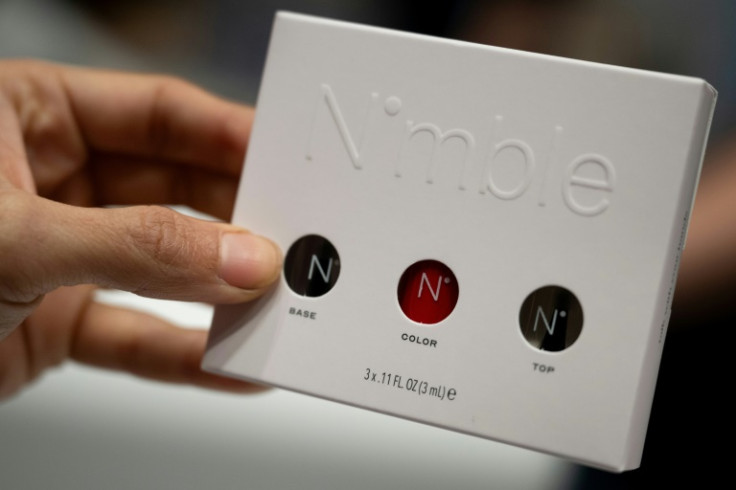
Salon-worthy manicures at home and expert skin care advice from artificial intelligence: the beauty industry is counting on tech to get consumers pampered like the rich and famous.
The Nimble manicure salon calls itself the world's first device to combine AI and complex robotics to paint nails flawlessly -- without the hassle of making an appointment.
Resembling a heavyset printer, Nimble can varnish all ten fingernails and dry them in just twenty-five minutes.
The device, an eight-kilo white box with a special door for the hand, is on display this week at the Las Vegas Consumer Electronics Show (CES), the tech industry's annual hub.
According to its creators, the device uses high-resolution micro-cameras and 3-D imaging to determine nail shape, size and curvature.
Then a small robotic arm, guided by AI algorithms, applies the requisite three coats, with a blow dry after each applied layer.
When it goes on sale in March, more than thirty colors will be available in capsules costing $10 each. The unit costs $599.
In a study published in May, consulting firm McKinsey put the global beauty industry -- which includes skin- and hair care, perfume and make-up -- at $430 billion in 2022 and forecast it to reach $580 billion by 2027.
The industry's internet sales almost quadrupled between 2015 and 2022.
AI, a term often deployed as the latest catchphrase for anything tech, has also infiltrated beauty products such as make-up and skincare, including from industry giants.
The free Beauty Genius app, presented by L'Oreal, is intended to be an AI-supported "virtual personal advisor."
It recommends skincare and make-up products according to skin type, gives tips on techniques and answers questions about problems such as acne and hair loss.
Users can also try out the products virtually, guiding customers who are overwhelmed by a physical shop's rows of foundations with similar shades and varied textures, or creams with seemingly endless specificities.
This is also the aim of the program Beautiful AI, created by Perfect Corp, which combines generative AI and virtual reality to perform live skin analyses, 3-D hairstyle or jewelry trials and make recommendations.
Korea's Prinker, a specialist in ephemeral, customizable tattoos for skin and hair, is unveiling a similar product that will apply make-up this year.
The device will also put AI to work with a biometric 3-D scanner to map facial features and then recommend the right contours, "printing" the corresponding powders to the face.
Companies are also bringing beauty personalization tech to hair care.
This week, L'Oreal presents the world premiere of a connected hairdryer that can be customized via an app, taking hair type into account and automatically adapting power and heat distribution.
The Airlight Pro uses infrared light to dry the hair, allowing it to preserve the hair's moisture, Adrien Chretien, head of augmented beauty development at L'Oreal, told AFP.
Due to go on sale in April, it also offers energy savings of 31 percent compared with a conventional appliance, he added.
Another product scheduled for launch later this year is Colorsonic, a brush-like hair coloring device that uses cartridges and that L'Oreal says has been in development for nine years.







